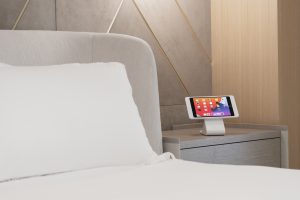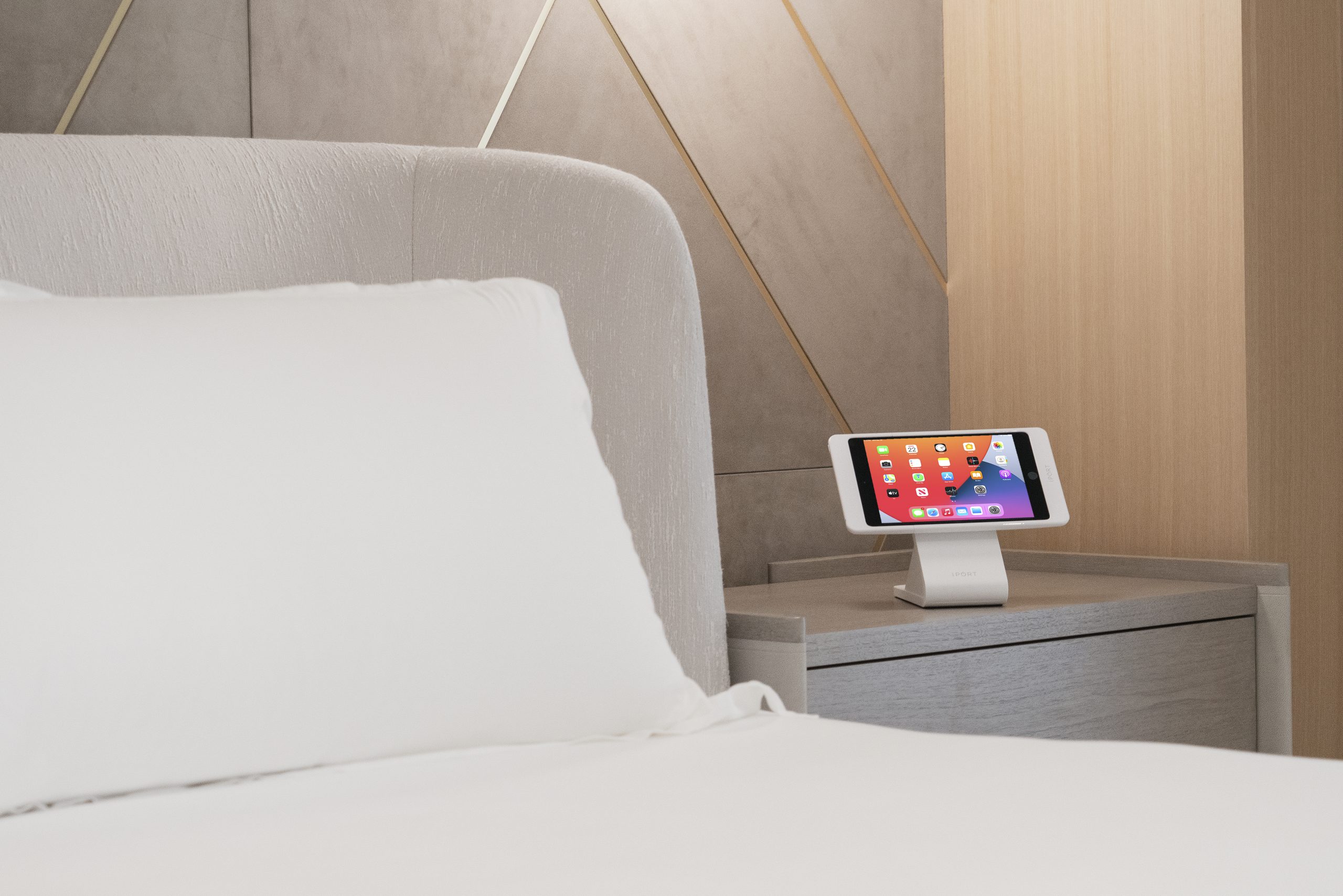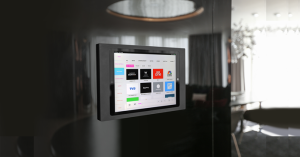Mobile tablets and devices are becoming increasingly popular in the hotel & hospitality industry due to their ability to enhance guest experience, streamline operations, and improve overall efficiency. Hotels are adopting mobile technology for a variety of purposes, ranging from guest service to back-end operations. Here’s a breakdown of how mobile tablets and devices are being used in hotels and the reasons behind their growing adoption:
Guest Service and In-Room Entertainment
Mobile tablets in hotel rooms are often used as a central hub for guest services and entertainment.
- In-Room Control: Tablets in hotel rooms allow guests to control various aspects of their stay, such as adjusting the lighting, temperature, or curtains, and even managing in-room entertainment like TVs or sound systems. This offers guests greater comfort and convenience.
- Room Service and Ordering: Guests can use tablets to order food, beverages, or amenities directly from their room. Many hotels integrate their tablets with a digital menu or room service system, allowing guests to place orders without having to call the front desk or dial a number. According to a 2019 study by Hospitality Technology, over 50% of hotels were offering digital ordering solutions via in-room tablets or mobile apps.
- Information Access: Tablets can provide information about hotel amenities, local attractions, restaurant reservations, spa bookings, and more. This reduces the need for printed materials and improves the speed at which guests can access the information they need. It could also be a ‘silent’ revenue source for hotels providing upselling opportunities and even advertising revenue from third party services.
- Check-In/Check-Out: Many hotels are adopting self-check-in and check-out kiosks or mobile apps, allowing guests to bypass the front desk. Some hotels offer tablets in the lobby that allow guests to check in, select room preferences, and complete transactions digitally.

Mobile Concierge Services
Hotels are increasingly using tablets to provide mobile concierge services to guests, offering personalized recommendations and assistance.
- Personalized Recommendations: Tablets or apps allow guests to receive tailored recommendations for activities, restaurants, and excursions based on their preferences or past stays. Many hotels have integrated local area guides and customized itineraries into their tablet systems to improve the guest experience.
- Instant Communication: Tablets in rooms or mobile apps provide guests with instant messaging systems to communicate directly with hotel staff. This can be used for special requests, housekeeping services, or to inquire about hotel services without needing to call the front desk.
- On-Demand Services: Many hotel chains allow guests to use tablets or smartphones to request housekeeping, maintenance, or other services. This functionality makes it easier for staff to respond promptly, improving overall guest satisfaction.
Operational Efficiency and Staff Communication
Tablets are not only a tool for guests but also an important asset for hotel staff to increase operational efficiency.
- Housekeeping and Maintenance Management: Hotel staff, including housekeeping and maintenance teams, use tablets to track room status, log maintenance requests, and report issues in real time. Tablets allow staff to update records instantly and track the progress of tasks, leading to faster and more efficient service. For example, housekeepers can mark rooms as cleaned or request supplies directly from their tablets.
- Point of Sale (POS): In restaurants, bars, and retail areas within hotels, tablets are often used as portable POS systems for staff to take orders and process payments directly at the table. This speeds up the ordering process, reduces wait times, and eliminates the need for stationary cash registers, resulting in a better customer experience and increased sales.
- Staff Collaboration and Scheduling: Tablets and mobile devices help hotel managers communicate with their teams, assign tasks, and track employee schedules in real time. This streamlines operations, reduces errors, and helps management ensure that all departments run smoothly.
Mobile Payment and Keyless Entry
Mobile devices are increasingly being used in payment processing and keyless entry systems in hotels.
- Mobile ordering and payment: In areas such as restaurants, staff are using mobile phones with access to specific applications, to take the customers order and pay their bill without the need for a separate device. Slick, convenient and professional.
- Mobile Payment Solutions: Many hotels have adopted mobile payment systems, allowing guests to check out, book services, or pay for meals using their tablets or smartphones. By using mobile payment systems like Apple Pay, Google Pay, or hotel-specific apps, guests can pay securely and quickly.
- Keyless Room Entry: Many modern hotels offer mobile key systems, where guests can unlock their room doors with their smartphones or tablets, eliminating the need for traditional key cards. This enhances security and convenience for guests, as they no longer need to worry about losing key cards.
Guest Feedback and Surveys
Tablets are commonly used in hotels to collect real-time guest feedback.
- Surveys and Reviews: Hotels use tablets to prompt guests to complete satisfaction surveys either in-room or at check-out. These surveys provide valuable insights into the guest experience, allowing hotels to make improvements and identify issues quickly. Tablets can also be used to collect guest reviews for specific services or experiences, offering real-time feedback on what worked well and what needs improvement.
- Instant Feedback for Improvement: Mobile feedback systems allow guests to provide comments or suggestions during their stay. This can be critical in addressing issues before the guest checks out, leading to improved satisfaction and potentially higher ratings.
Marketing and Upselling
Tablets and mobile devices are powerful tools for marketing and upselling within the hotel.
- Upselling Opportunities: Tablets in rooms can present guests with personalized upsell options, such as premium services, spa treatments, or access to exclusive amenities. Based on the guest’s preferences, the system can recommend services that improve their stay while increasing revenue for the hotel.
- Promotions and Loyalty Programs: Hotels can use tablets to promote special offers, seasonal discounts, or loyalty programs. Tablets in guest rooms, as well as mobile apps, can help hotels target guests with personalized promotions during their stay, driving higher revenue and guest retention.
Why Hotels Are Adopting Mobile Devices
- Improved Guest Experience: Mobile tablets streamline guest interactions, allowing them to access services more easily and independently. This enhances the overall experience, contributing to higher satisfaction and potentially more positive reviews.
- Operational Efficiency: Tablets enable hotel staff to perform tasks more efficiently, improving service delivery, reducing errors, and saving time. Streamlined communication and management systems help optimize operations across various hotel departments.
- Cost Reduction: By digitizing services and reducing paper usage, hotels can lower operational costs. Additionally, mobile solutions like self-check-in can reduce the need for extensive front desk staff, allowing employees to focus on more personalized services.
- Competitive Advantage: As guests increasingly expect digital experiences, offering mobile-first services, such as in-room tablets for control and ordering, positions hotels as forward-thinking and customer-centric, setting them apart from competitors.
- Personalization: Tablets and mobile apps enable hotels to provide a more personalized experience, from recommending activities based on guest preferences to offering tailored promotions. Personalization drives guest loyalty and repeat business.
Conclusion
Some of the biggest hotel Mobile tablets and devices are transforming the hotel industry by enhancing both the guest experience and operational efficiency. From in-room control and room service ordering to staff communication and mobile key systems, these technologies provide significant advantages for both guests and hotel operators. By integrating mobile-first solutions, hotels can offer better service, reduce costs, and improve guest satisfaction, all while keeping up with the growing demand for technology-driven hospitality experiences.
How can we help?
The IPORT platform is proven and ideally suited to hotel environments with its combination of stylish appearance and practical features developed off the back of countless hotel deployments. Contact us to find out more and see how the IPORT range can enhance your guest services.


